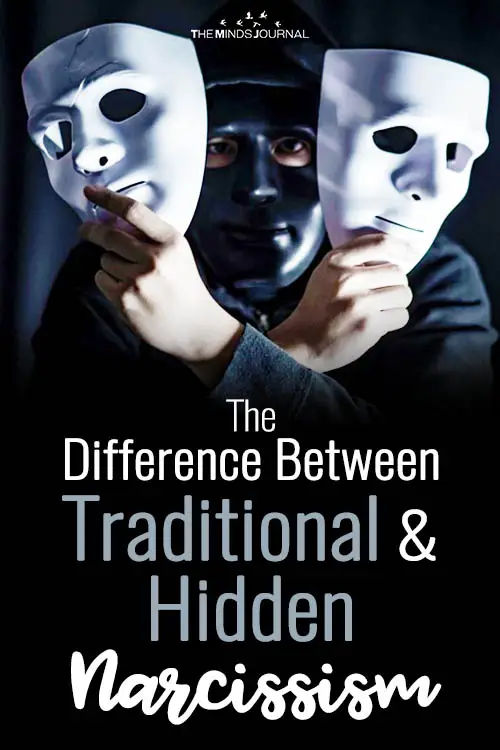What is hidden narcissism? What’s the difference between the ‘traditional’ and the hidden narcissism? – QuoraBy Dr. Elinor Greenberg
“Hidden Narcissism” and “Traditional Narcissism” are not official diagnostic terms.
Traditional Narcissist or The Exhibitionist Narcissist:
This is the most easily recognizable form of Narcissistic Personality Disorder. When someone uses the term “traditional,” they are probably referring to the Exhibitionist Narcissist subtype. Exhibitionist Narcissists like to:
- Be the center of admiring attention.
- Appear supremely confident.
- Dominate the conversation.
- Control what is happening.
- Be recognized as special and entitled to special treatment.
- Tell long repetitive stories that they believe show them in a good light.
- Devalue anything and anyone that dares challenge them in any way.
- Associate with people, organizations, and objects that they regard as enhancing their own status.
Related – 12 Signs You Are Married To A Narcissist
Hidden Narcissists or The Closet Narcissist:
This subtype of NPD might be called “Hidden Narcissists” because they are much less obvious about how they get their narcissistic supplies. Sometime during childhood, they were actively discouraged from showing off or devalued whenever they were noticed. Their desire to be seen as special went underground. Closet Narcissists typically are:
1. Afraid of the spotlight.
2. Not openly grandiose.
3. Afraid that being the center of attention will lead to having all their inadequacies exposed.
4. Filled with envy for what other people have that they do not have—including self-confidence.
5. Manipulative and indirect about getting what they want from other people.
6. Rarely confrontative.
7. Passive-aggressive.
8. Likely to gossip about you behind your back.
9. Not to be trusted with secrets. If it suits their needs, they will tell everyone everything they swore to you to keep mum about.
10. Likely to give you the cold shoulder and cut you out of their life when they are angry with you.
11. Getting their narcissistic supplies from being close to people or organizations that they admire.
12. Prone to giving overly lavish gifts or doing lots of unasked for favors in the expectation of putting the other person in their debt. Then they feel victimized when the other person does not do similar things for them.
13. Are filled with contentment when they get a compliment from someone that they idealize as special.
Related: – How A Narcissist Plays You And How Their Cycle Of Abuse Works
Punchline:
Not all people with Narcissistic Personality Disorder look like Hollywood’s idea of an arrogant and domineering Narcissist. Some initially appear meek and mild or present themselves as a victim.
So, did you spot a Hidden Narcissism in your life? Leave a comment below
Read on to know Who Is A Narcissist And What Makes One
For a detailed understanding of Narcissism and its discontents watch out the video by Dr Ramani Durvasula
Written by Elinor Greenberg, Ph.D.
Originally appeared in Quora









Leave a Reply
You must be logged in to post a comment.